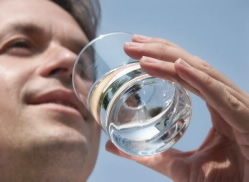EMBARGOED FOR RELEASE | August 23, 2010
Clinical trial confirms effectiveness of simple appetite control method
Note to journalists: Please report that this research was presented at a meeting of the American Chemical Society
BOSTON, Aug. 23, 2010 — Has the long-sought magic potion in society’s “battle with the bulge” finally arrived? An appetite-control agent that requires no prescription, has no common side effects, and costs almost nothing? Scientists today reported results of a new clinical trial confirming that just two 8-ounce glasses of the stuff, taken before meals, enables people to shed pounds. The weight-loss elixir, they told the 240th National Meeting of the American Chemical Society (ACS), is ordinary water.
“We are presenting results of the first randomized controlled intervention trial demonstrating that increased water consumption is an effective weight loss strategy,” said Brenda Davy, Ph.D., senior author on the study. “We found in earlier studies that middle aged and older people who drank two cups of water right before eating a meal ate between 75 and 90 fewer calories during that meal. In this recent study, we found that over the course of 12 weeks, dieters who drank water before meals, three times per day, lost about 5 pounds more than dieters who did not increase their water intake.”
Media Contact
During the meeting, Aug. 22-26, the contacts can be reached at:
617-954-3522
Michael Bernstein
202-872-6042
m_bernstein@acs.org
Michael Woods
202-872-6293
m_woods@acs.org
“People should drink more water and less sugary, high-calorie drinks. It’s a simple way to facilitate weight management.”
Davy pointed out that folklore and everyday experience long have suggested that water can help promote weight loss. But there has been surprisingly little scientific information on the topic. Previous studies hinted that drinking water before meals reduces intake of calories. Lacking until now, however, has been the “gold-standard” evidence from a randomized, controlled clinical trial that compares weight loss among dieters who drink water before meals with those who do not.
The study included 48 adults aged 55-75 years, divided into two groups. One group drank 2 cups of water prior to their meals and the other did not. All of the subjects ate a low-calorie diet during the study. Over the course of 12 weeks, water drinkers lost about 15.5 pounds, while the non-water drinkers lost about 11 pounds.
Davy said water may be so effective simply because it fills up the stomach with a substance that has zero calories. People feel fuller as a result, and eat less calorie-containing food during the meal. Increased water consumption may also help people lose weight if they drink it in place of sweetened calorie-containing beverages, said Davy, who is with Virginia Tech in Blacksburg, Va.
Diet soda pop and other beverages with artificial sweeteners may also help people reduce their calorie intake and lose weight, Davy said. However, she advised against using beverages sweetened with sugar and high-fructose corn syrup because they are high in calories. A 12-ounce can of regular soda pop, for instance, contains about 10 teaspoons of sugar.
Davy noted that that nobody knows exactly how much water people should drink daily. The Institute of Medicine, an agency of The National Academies, which advises the Federal Government on science, says that most healthy people can simply let thirst be their guide. It does not specify exact requirements for water, but set general recommendations for women at about 9 cups of fluids — from all beverages including water — each day, and men at about 13 cups of fluids.
And it is possible to drink too much water, a situation that can lead to a rare, but serious, condition known as water intoxication, Davy pointed out.
The Institute for Public Health and Water Research, a non -profit, independent science and education organization whose mission is to improve public health through the consumption of quality drinking water, funded the study.
###



